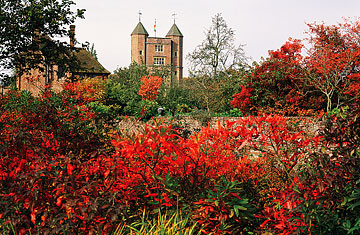
Old growth Sissinghurst is administered today by England's National Trust
Anyone who has smiled politely through tales of home improvements knows how absorbing they are to the owners, and how deadly dull to everyone else. But Sissinghurst: An Unfinished History, Adam Nicolson's 2008 account of reinstating a farm on his family's land in southeastern England, is no flat-footed story of problems laboriously surmounted. Rather, it's a richly layered memoir of a small patch of Kent and its human inhabitants. Above all else, however, it's a love song.
As with any home, the house and garden that frame Nicolson's story are reflections of the family who live there — but what a family! His grandparents were poet Vita Sackville-West and writer and diplomat Harold Nicolson: both gay, serially unfaithful and voluminous letter writers. Novelist Virginia Woolf was one of Vita's numerous high-society conquests. Violet Trefusis was another. (Trefusis' clan has form — she was the daughter of one famous royal mistress, Alice Keppel, and great-aunt of another, Camilla Parker-Bowles.) And yet, in the midst of shattering infidelities, Harold and Vita were able to turn their attention to such harmonious things as trees, flowers and shrubs. Upon moving to Sissinghurst, they created between them a garden of such beauty that it was already attracting a paying public in the 1930s.
No surprise, though, that the marriage produced peculiar offspring: Nigel Nicolson was a cold husband and father, and it's remarkable that his son himself is so well balanced. Nature saved Adam Nicolson, traced back through a boyhood spent fishing, climbing trees and pedaling through lanes a thousand years old. The Kentish Weald became a guardian to the neglected boy, providing the kind of stability his unhappy parents could not.
In contrast to Sissinghurst the garden and too-perfect national treasure ("heritage horticulture with a lesbian-aristocratic gloss" is his acid description), Nicolson wants to restore the land to an older incarnation, as an honored partner that sustains itself and its inhabitants. Place is everything, he argues. It shapes us and we shape it, past and present folded together. But this is no green lecture. Nicolson's delicious pudding of a book mixes history, anecdote and agriculture with sharp sketches of the people he meets along the way. The effect is to leaven his struggles with bureaucracy, recalcitrant staff and budgets that won't balance. The battles are protracted, insults fly — his family are "white trash" in one furious exchange — but the author slowly comes to see that the antagonism is sparked by anguish. Everyone around him has a story to tell and is just as rooted in the land as he is. Slowly, together, they grope toward common understanding.
The subtitle, An Unfinished History, makes clear there is no end to this story. But Nicolson's warmth, humor and energy suggest that, for this generation at least, the land is in good hands.
